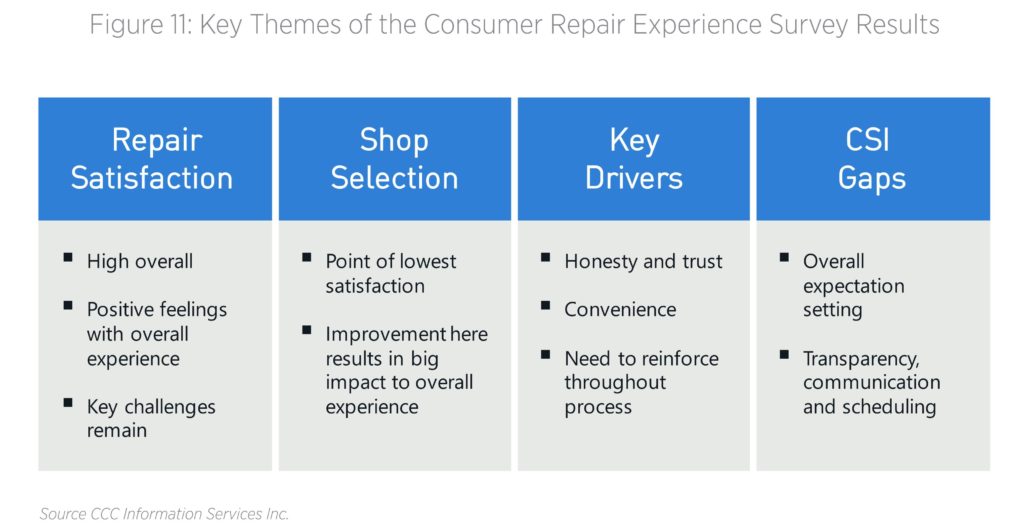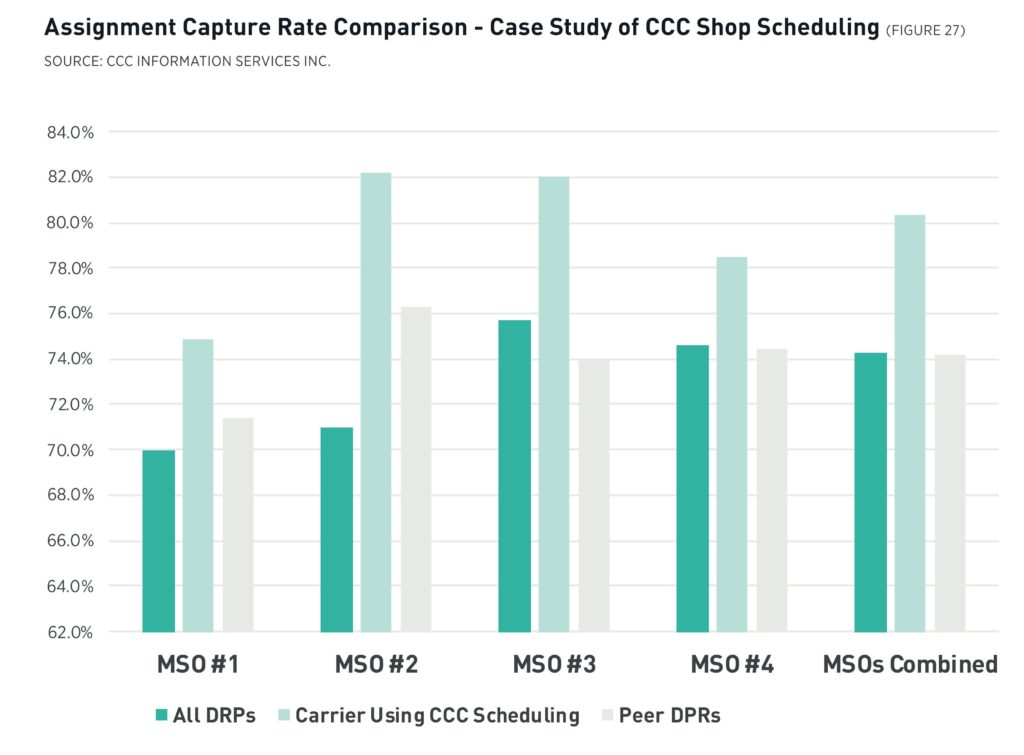
JD Power, CCC data examines consumer shop selection, self-scheduling
By onBusiness Practices | Education | Insurance | Market Trends | Technology
J.D. Power data shows customers respond well to assistance in picking a collision repairer, Safelite claims experience Michael Naoom told a CIECA webinar Tuesday.
Claimants given assistance when they want more help picking a shop had a 78-point higher overall CSI score than those who didn’t, Naoom said on the June “CIECAst,” citing a 2017 J.D. Power auto claims study.
Naoom said J.D. Power considers three points of CSI score significant, so the jump from 798 to 876 is a “really big difference.”
Repair process satisfaction rose to 877 versus 791, he said.
In fact, consumers who used an insurer’s recommended shop were “more satisfied” than consumers who used a facility they had in mind, Naoom said. (It was unclear if these last two points were derived from the same J.D. Power study.)
What’ll be interesting to watch here (assuming J.D. Power or someone studies it) will be the differences between OEM referral help compared to insurance referral help.
Ford found 52 percent of customers felt choosing a body shop certified by a manufacturer was more important than one conveniently located (7 percent), recommended by the insurance company (20 percent) and recommended by a friend or family member (21 percent).
Ford global collision marketing Rob Johnston told a Guild 21 call that the OEM found those results “really interesting” and somewhat “eye-opening,” he said.
CCC data from the company’s 2019 “Crash Course” and June trends study present another interesting perspective on referrals and shop choice.
In June, CCC reported that a study of consumers it did with Magid found shop selection to be the “Point of lowest satisfaction,” and “Improvement here results in big impact to overall experience.”
“Essentially, the study identified that overall customers are satisfied and leave the repair experience with positive feelings,” CCC director, industry analyst, and “Crash Course” lead author Susanna Gotsch wrote. “However, this general satisfaction with the experience masks some underlying issues throughout the process: specifically with the selection process; and the ability of shops to convey trust and differentiation; and deliver transparency throughout the process. Providing consumers with capabilities like online shop scheduling supports a unified, digital experience across the claim/repair process in a personalized manner – like what consumers experience on Amazon today. This single, digital experience also helps provide transparency into the shop during the selection process – something our repair experience survey identified as critical to their overall satisfaction.”
One CCC shop self-selection method recently featured into a high-profile partnership with Volvo.
Volvo is using CCC Accident Advisor, and a promotional video posted in May showed Volvo Car Accident Advisor providing a locator map to nearby body shops. A detail page for one facility showed a repairer with check marks indicating they were both “Volvo Certified” and “In Network,” the latter possibly a reference to a direct repair program.
“All shops are available but in terms of ranking Shops that participate in the Volvo Certified Collision Program and the customer’s Insurance DRP (where applicable) will rank first followed by Volvo Certified Collision Shops, Insurance DRP shops, and independents in that order,” Volvo product and technology communications manager Jim Nichols explained in an email.
CCC spokeswoman Kiley Ribordy of Walker Sands indicated the information provider’s core Accident Advisor technology is populated with shops from CCC’s user base.
“The 26k+ vehicle repair shops that currently use CCC ONE are available in Accident Advisor,” Ribordy wrote. “The ‘Volvo Certified’ and ‘In Network’ shop labels are provided by Volvo and CCC’s insurer partners, respectively, through continuous updates to their respective repair programs. Accident Advisor offers a variety of sorting, filtering and configuration options to enable the consumer to navigate through an optimum selection of shops, at the consumer’s discretion.”
A shop selection tool combined with a means to self-schedule there could pay off in other ways for the shop and insurer besides CSI.
CCC in its 2019 “Crash Course” said it examined nearly 20,000 direct repair program assignments in the context of CCC Shop Scheduling usage.
It found customers who used the software to self-schedule “have a higher propensity to show up for the scheduled assignment – leading to higher assignment capture rates for the repairers who list their appointment times online for the consumer to book directly.”
As this CCC chart shows, the difference can be quite several percentage points higher compared to the capture rates for all DRPs and peer DRPs.
“With online shop scheduling available as a ‘next step’, the customer has the ability to select the repairer based on proximity, DRP program participation, on-line reviews, customer referrals, or availability of OE certification, essentially enabling the overall experience to occur on a single platform in a personalized manner – not too different from what consumers experience on Amazon today,” CCC wrote in the 2019 “Crash Course.” “Insurance companies and repairers who adopt a single platform can enable consumers to efficiently process their claim, schedule the repair, and ultimately deliver an experience more in-line with modern expectations.”
CCC director, industry analyst, and “Crash Course” lead author Susanna Gotsch this month reported customers also schedule appointments more quickly with a self-service feature.
“Analysis of claims data also reveals the overall time between when the customer has their estimate to when they schedule their vehicle in for repair is also less for those claims where the consumer has scheduled their appointment online themselves,” Gotsch wrote. “Access to key information on the repair shop such as proximity, DRP program participation, on-line reviews, customer referrals, or availability of OE certification all within the same platform may be helping consumers choose their repair shop quicker. And, perhaps more importantly, our repair experience survey revealed an easier scheduling process is a key variable driving overall customer satisfaction with the repair experience.”
More information:
“CIECAst 2019 06 18 Modern Claims Experience using Intelligent FNOL By Michael Naoom”
CIECAstandards YouTube channel, June 19, 2019
“Rethink Consumer Experiences”
CCC, June 1, 2019
Images:
In June, CCC reported that a study of consumers it did with Magid found shop selection to be the “Point of lowest satisfaction,” and “Improvement here results in big impact to overall experience.” (Provided by CCC)
CCC in its 2019 “Crash Course” said it examined nearly 20,000 direct repair program assignments in the context of CCC Shop Scheduling usage. It found customers who used the software to self-schedule “have a higher propensity to show up for the scheduled assignment – leading to higher assignment capture rates for the repairers who list their appointment times online for the consumer to book directly.” (Provided by CCC)
A customer appears at an auto repair facility. (LightFieldStudios/iStock)


